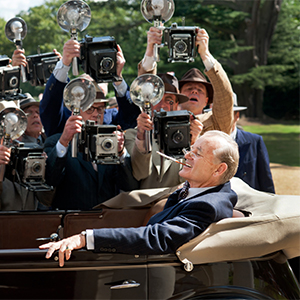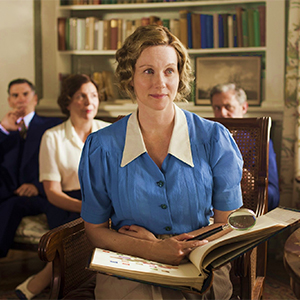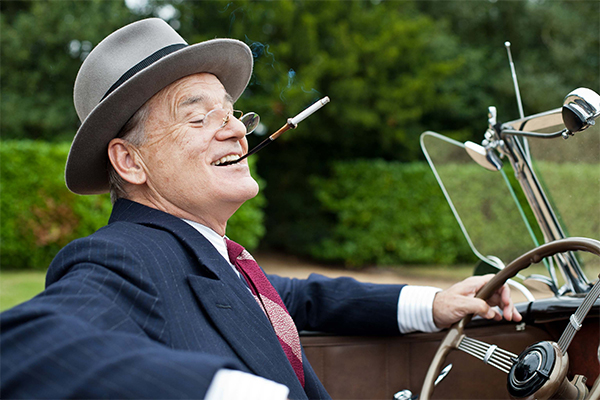Review: Hyde Park on Hudson (2012)
Cast: Bill Murray, Laura Linney, Olivia Williams
Director: Roger Michell
Country: USA
Genre: Biography | Comedy | Drama
Official Trailer: Here
Editor’s Note: Hyde Park on Hudson opens in North American theaters on December 7th.
It’s difficult to imagine a film more awkward and discomforting than Hyde Park on Hudson. Such a film would probably have to involve some sort of incest/bestiality combo. I’m stretching there, obviously, but only because it’s difficult to put precisely into words the tonal train wreck of Roger Michell’s film, which has been positioned as Oscar bait but emits the stench of fishing bait. I don’t necessarily have anything against art that depicting a version of historical figures that is perpendicular to our revered understanding –lord knows I’ve defended Hitchcock against just about everybody – but the nonsense this film is trying to peddle is borderline appalling.
More sinful, to me, is that the film is so tonally confused that it is, in varying turns, boring, laughable, and astonishing.
 Honestly, it’s not even as though I’m arguing for only deified portrayals of Franklin Delano Roosevelt, or even that what’s depicted in the film is untrue. More sinful, to me, is that the film is so tonally confused that it is, in varying turns, boring, laughable, and astonishing. This screenplay, a whopper by Richard Nelson that must contend for the worst of the year, seems at war with itself – do we revere FDR, judge him, or roll our eyes and smile? Do we treat his infidelity as earnest, farcical, or whimsical? Is this film supposed to make audiences laugh, cry, think…? I suppose the answer, inevitably, in some combination…and in this case the combination is damn near lethal.
Honestly, it’s not even as though I’m arguing for only deified portrayals of Franklin Delano Roosevelt, or even that what’s depicted in the film is untrue. More sinful, to me, is that the film is so tonally confused that it is, in varying turns, boring, laughable, and astonishing. This screenplay, a whopper by Richard Nelson that must contend for the worst of the year, seems at war with itself – do we revere FDR, judge him, or roll our eyes and smile? Do we treat his infidelity as earnest, farcical, or whimsical? Is this film supposed to make audiences laugh, cry, think…? I suppose the answer, inevitably, in some combination…and in this case the combination is damn near lethal.
Set in 1939, in the lead up to the War, Hyde Park on Hudson continues this year’s trend (started by Lincoln and Hitchcock) of Microcosm Biopic, taking a brief but significant snapshot in a historical life and using it to convey much more than a simple story. At least that was the case with the Lincoln and Hitch movies, since Hyde Park really tells us nothing about FDR, and at varying times isn’t even about him. The narrator is Daisy (Laura Linney), FDR’s distant cousin, who embarks on a long love affair with the commander-in-chief. Focusing on a little-known perspective, let alone a female one, is a laudable strategy in our culture of man-centered hero-worship biopics…except that this film really isn’t about Daisy, either. Sometimes it’s about her, sometimes it’s about FDR, and others it spends a long-ass time on King George VI (the one who gave the Speech), whose visit to FDR’s titular estate is the event around which the film’s would-be drama revolves. So yes, the screenplay alternates between these primary characters with higher frequency and less purpose than a common soap opera, yet we learn nothing about them other than simple facts: Bertie stutters, FDR likes to smoke and screw, and Daisy feels alternately proud and ashamed of her affair.
…Hyde Park really tells us nothing about FDR, and at varying times isn’t even about him.
 I’m getting ahead of myself. First, THE PLOT! The United Kingdom is seeking U.S. support in the war effort, and so “Bertie” (played not by Colin Firth but by Van Helsing alum Samuel West) makes an unprecedented trip to visit FDR’s home-away-from-home. That particular event, which plays like the Masterpiece Theater episode PBS shelved for 15 years, is muddled in its importance – though a better film would likely reinforce its relevance without meddling with FDR multiple sexual dalliances, Polio-be-damned. A weekend at FDR’s summer home, with a foreign Head of State visiting while multiple mistresses frolic about…sounds like a British farce, no? It might play better that way, though we’ll never know, since the only testament to this film being made is the dry, soulless dirge that flickers before us for a too-long 95 minutes.
I’m getting ahead of myself. First, THE PLOT! The United Kingdom is seeking U.S. support in the war effort, and so “Bertie” (played not by Colin Firth but by Van Helsing alum Samuel West) makes an unprecedented trip to visit FDR’s home-away-from-home. That particular event, which plays like the Masterpiece Theater episode PBS shelved for 15 years, is muddled in its importance – though a better film would likely reinforce its relevance without meddling with FDR multiple sexual dalliances, Polio-be-damned. A weekend at FDR’s summer home, with a foreign Head of State visiting while multiple mistresses frolic about…sounds like a British farce, no? It might play better that way, though we’ll never know, since the only testament to this film being made is the dry, soulless dirge that flickers before us for a too-long 95 minutes.
Sad fact is, Murray is quite good in the role, which I’m sure was intended as his second shot at Oscar glory, though his best efforts are foiled by the film, which is such a slog that no one will take any piece of it seriously. Linney is fine, though the script so mishandles her character – charting a zigzag path from unassuming to willing to jealous to angry to proud – that it makes the performance seem uneven, though Linney is just doing as directed. The person on whom this reflects especially badly is a stunner: Roger Michell, the director, who is a brilliantly skilled and ambitious filmmaker (Notting Hill, Changing Lanes, Enduring Love), but who can’t seem to wrap his brain around what movie he’s making here. The camera glides smoothly, the shots are lit evocatively, and the editing is occasionally anachronistic…but then characters start talking, the film stops dead, and we wonder what all these talented people were thinking as they read this script.
-
http://www.facebook.com/bryan.murray.33 Bryan Murray


















 Review: The Hobbit - An Unexpected Journey (2012)
Review: The Hobbit - An Unexpected Journey (2012) Review: The Impossible (2012)
Review: The Impossible (2012) Review: Hyde Park on Hudson (2012)
Review: Hyde Park on Hudson (2012)

